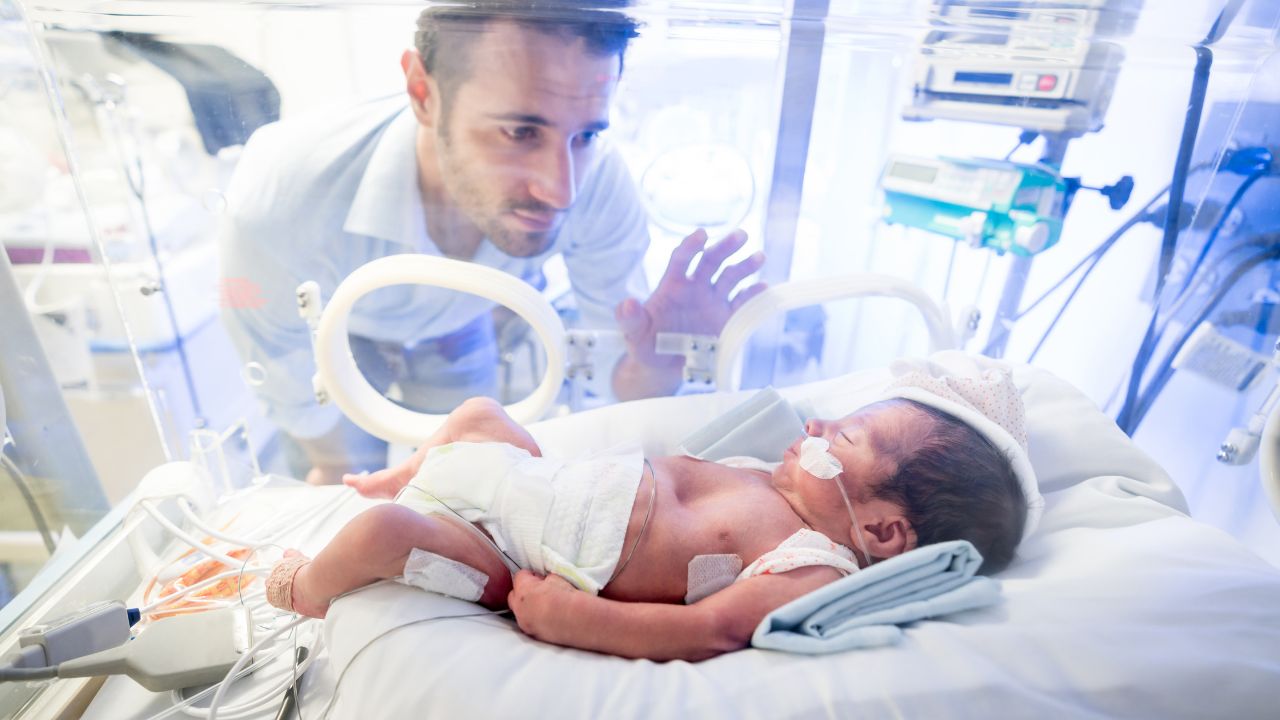Pediatric Nursing Specialty: Peds Jobs Resource Guide

The US Bureau of Labor Statistics estimates that every year 194,500 new nurses are needed to cover the healthcare needs of a growing US population. Regarding pediatrics, in the United States, approximately 18.37% of the population are children aged zero to fourteen years old. In the hospital setting, 5.7% of patients are children or adolescents requiring the care of approximately 180,521 registered nurses (RNs), and this percentage increases to 13% of patients in non-hospital settings. Therefore, it comes as no surprise that pediatric nurses are in great demand.
In the context of an ongoing nursing shortage and an ever-increasing US population, nurses are needed more than ever in pediatrics as well as across a wide range of other nursing specialties. Whether you are considering becoming a nurse or are a licensed nurse already deciding which career path to pursue, read on to learn all there is to know about pediatric nursing to help you determine if this specialty is ideal for you. Learn about work settings, nurse responsibilities, certifications, salary, and more.
What Does Pediatric Mean in Medical Terms?

By definition, pediatric nursing refers to the care and treatment of children and youth from newborn age until adulthood with the collaboration of their families; pediatric nurses promote their patients’ health, manage their illnesses, and restore their health. This nursing specialty requires knowledge of child development and children’s particular physical and psychological characteristics since children cannot simply be treated as small adults.
Family members are always important contributors to patients’ health, but families are even more essential in pediatric nursing since they play such vital roles in children’s lives and development. Therefore, pediatric nurses must respect families’ diversity, values, and choices.
Another vital characteristic of pediatric nursing is providing atraumatic care, therapeutic care that minimizes children’s and families’ psychological and physical distress.
Where Do Pediatric Nurses Work?
According to the Institute of Pediatric Nursing, pediatric registered nurses (RNs) work in a variety of settings, including the following:
- Free-standing children’s hospitals: 30.3%
- Children’s hospitals associated with major medical centers: 28.3%
- Outpatient specialty care: 11.7%
- Community hospitals: 9.9%
- Outpatient primary care: 5.1%
- Major medical centers: 4.8%
- School settings: 2.4%
- Home health care: 2%
- Ambulatory surgery centers: 0.8%
- Psychiatric/mental health facilities: 0.4%
- Urgent care: 0.2%
- Rehabilitation or extended care facilities: 0.2%
However, pediatric advanced practice registered nurses (APRNs) have a significantly different work distribution. Here is where pediatric APRNs work:
- Primary care outpatient clinics: 48%
- Subspecialty clinics: 24%
- Hospital inpatient settings: 9.34%
- School-based health settings: 5.85%
- Emergency room (ER) settings: 2.86%
- Academia: 7.39%
- Military settings: 1.39%
- Home health care: 0.56%
- Retail-based clinics: 0.42%
What Is a Pediatric Unit in a Hospital?
Even within hospitals, pediatric nurses can work in many settings, such as the general pediatric unit, cardiac surgery intensive care unit, newborn intensive care unit, pediatric intensive care unit, pediatric infusion therapy center, pediatric rehabilitation unit, pediatric transplant unit, and pediatric emergency department.
What Does PICU Stand For?
Hospital units often have abbreviations for their names. PICU is an abbreviation for pediatric intensive care unit. Other common abbreviations in pediatrics are NICU, which stands for newborn intensive care unit, CSICU, which stands for cardiac surgery intensive care unit, and PITC, which stands for pediatric infusion therapy center.
What Does a Pediatric Nurse Do?

In general terms, pediatric nurses care for children and adolescents with the support of children’s families and in conjunction with other healthcare professionals. They assess, plan, implement, and evaluate nursing care for pediatric patients, considering their medical, social, cultural, and family circumstances.
What Is the Specific Role of a Pediatric Nurse?
For the most part, pediatric nurse duties are similar to any other nurse’s responsibilities. However, some tasks are particular to or more common in pediatrics. Here are some typical pediatric nurse responsibilities:
- Recording a patient’s height and weight
- Checking and documenting children’s vital signs
- Performing screenings and examinations
- Giving immunizations
- Managing medications
- Caring for children before, during, and after surgery
- Caring for chronically or acutely ill children
- Teaching parents how to care for their children
- Drawing blood and obtaining other samples
- Ordering diagnostic tests
How to Become a Pediatric Nurse?
Pediatric nurses are RNs or APRNs with experience in pediatrics. Ideally, pediatric nurses also pursue one or more certifications in their nursing specialty.
Pediatric Nurse Certification?
Besides obtaining an RN or APRN license, basic certifications all pediatric nurses should consider pursuing are the Pediatric Advanced Life Support (PALS) certification or the Pediatric Emergency Assessment, Recognition and Stabilization (PEARS®) certification. The American Heart Association offers both of these courses, and the American Red Cross also offers the
PALS certification.
Additionally, the Pediatric Nursing Certification Board (PNCB) offers the Certified Pediatric Nurse (CPN) exam for RNs wishing to specialize in pediatrics. The following are the requirements for this certification:
- Current valid RN license
- 1,800 clinical hours in pediatrics within the previous two years
- Or a total of 3,000 clinical hours in pediatrics within the past five years with a minimum of 1,000 hours in the past two years
The PNCB also offers the following exams for nurses with master’s or doctoral degrees in nursing:
- Certified Pediatric Nurse Practitioner – Primary Care (CPNP-PC)
- Certified Pediatric Nurse Practitioner – Acute Care (CPNP-AC)
- Pediatric Primary Care Mental Health Specialist (PMHS)

Furthermore, the American Nurses Credentialing Center offers a Pediatric Nursing Certification (PED-BC™) for RNs. Here are the requirements for this certification:
- Current valid RN license
- Two years of work experience as a full-time RN
- 2,000 clinical hours in pediatrics within the past three years
- Thirty hours of continuing education completed within the previous three years
The American Association of Critical Care Nurses offers three nursing certifications in pediatrics, in addition to three certifications in neonatal care.
- The Acute/Critical Care CCRN (Pediatric) certification is for nurses who work with critically ill pediatric patients. These nurses may work in intensive care units, cardiac care units, combined ICU/CCUs, medical-surgical ICUs, trauma units, or critical care transport/flight. RNs or APRNs interested in pursuing this certification must meet the following eligibility criteria:
- Current valid RN or APRN license
- 1,750 clinical hours in the direct care of acutely ill pediatric patients within the previous two years, with 875 hours accrued within the last year
- Or 2,000 clinical hours in the direct care of acutely ill pediatric patients within the previous five years, with at least 144 hours accumulated during the last year
- The Acute/Critical Care Knowledge Professional CCRN-K (Pediatric) exam is designed for nurses who do not primarily provide direct care to critically ill pediatric patients but influence this care. They may work as clinical educators, managers/supervisors, directors, and academic faculty or nursing administrators. Requirements for this certification include the following:
- Current valid RN or APRN license
- 1,040 practice hours in the previous two years (260 accrued within the past year) applying knowledge influencing patients, nurses, or organizations to positively impact critically ill pediatric patients and their families
How Long Does It Take to Become a Pediatric Nurse?
Depending on whether nurses choose to work in pediatrics as RNs or APRNs, as well as other factors, required training and work experience could take anywhere from two to more than six years. This variation is due to the diversity of nursing programs and their requirements, as well as personal factors. For example, potential nurses can become RNs through associate’s or bachelor’s degree nursing programs; the former takes approximately two years while the latter takes about four. Nurses could then start working in pediatrics.
However, many nurses decide to pursue higher studies, which evidently extends their preparation time—usually by two to three years. Additionally, some master’s programs require nurses to have more work experience than others, contributing to the duration of APRN preparation. Considering all these factors, becoming an APRN can take six years, but it often takes much longer.
Finally, some nurses will naturally take longer than others to specialize in their chosen area for personal reasons, such as taking time off to help family members or taking a gap year between nursing school and a master’s program.
How Much Do Pediatric Nurses Make?
The main factor affecting a pediatric nurse’s potential salary is their level of education. Whereas RNs make approximately $82,750 annually, APRNs earn on average $118,040. That said, even among RNs, there can be a significant variation in earnings depending on their work settings. Here are the average annual salaries for RNs in different types of facilities:

- Outpatient care centers: $93,070
- General medical and surgical hospitals: $85,020
- Specialty hospitals except for psychiatric and substance abuse hospitals: $84,800
- Psychiatric and substance abuse hospitals: $80,260
- Home health care services: $78,190
- Offices of physicians: $73,860
- Nursing care facilities (skilled nursing facilities): $72,260
Similarly, APRN salaries can vary greatly depending on nurses’ work settings. The following salaries represent averages for APRNs in various settings:
- Home health care services: $133,170
- Psychiatric and substance abuse hospitals: $131,830
- Outpatient care centers: $129,190
- General medical and surgical hospitals: $122,960
- Offices of physicians: $114,870
- Offices of other health practitioners: $108,890
What Is Pediatric Nursing Like?
Pediatric nurses can potentially spend more time with their patients than any other type of nurse. This extended time is due to the fact that nurses may see the same patients from birth until adulthood. Furthermore, pediatric nurses usually spend more time with pediatric patients during each visit than with adult patients since they often need to explain procedures and gain the trust of both patients and family members.
Many pediatric nurses win over their patients by wearing colorful scrubs with fun prints, handing out stickers, and making silly faces. However, these practices do not subtract from the importance and seriousness of pediatric nursing. Children can deal with health conditions that are just as serious as those of adults, and making a difference in a child’s life is extremely rewarding for nurses.
Is Pediatric Nursing Hard?
All nursing specialties have challenges. In particular, pediatric nursing is very physically and emotionally demanding. Nurses may have to lift children and even heavy equipment. Plus, they will be on their feet nearly their entire shift. Furthermore, pediatric nurses must have great empathy, patience, and compassion, especially when delivering bad news to patients and their families. Sometimes, pediatric nurses simply need to check healthy patients and measure their height and weight. Still, other times, pediatric nurses must care for very sick or even dying children, and this may be incredibly taxing for them.
In addition, pediatric nurses are mandated reporters, meaning they are obligated to report potential child abuse, which can also be very difficult and stressful for nurses.
Why Choose Pediatric Nursing
Choosing a nursing specialty is a very personal decision based on nurses’ unique personalities, interests, and abilities. Nurses who choose to work in pediatrics should love children and enjoy working closely with families as well.
Many nurses decide on pediatrics because they have children themselves and have experienced first-hand how valuable a compassionate and caring provider can be in children’s experience with healthcare. Others have a natural affinity with children and enjoy goofing around and making them laugh.
Whichever the motivation may be, pediatric nursing is undoubtedly an essential and noble nursing specialty.
What Makes a Good Pediatric Nurse?
Being an excellent pediatric nurse goes way beyond knowledge of diseases, procedures, and medications. Here are some crucial qualities and abilities that pediatric nurses must have:
- Reading patients’ body language and other non-verbal cues when children are too young or too scared to talk
- Explaining complex conditions or procedures in simple terms
- Assuaging fears and comforting children
- Gaining the trust of patients and family members
- Maintaining flexibility and respect for families’ values, beliefs, and choices
- Collaborating effectively with a multidisciplinary team
Tips for New Pediatric Nurses?

If you just landed a new job in pediatrics or if you are just starting to consider the specialty, here are some of the most important tips you can follow:
- Never tune out patient chatter: You might be tempted to ignore what children are saying when you are in their rooms managing their IVs or collecting lab samples, but they may actually give you essential clues to symptoms you were unaware of or help you better gauge their level of pain.
- Be patient, compassionate, and empathetic: This truly cannot be stressed enough. Your patients may be in the hospital for the very first time; they may not have much experience outside their homes or interacting with other people. Needless to say, they may be scared and confused on top of feeling unwell. Therefore, take time to gain their trust, and you will be able to carry out procedures and treatments much more easily—not to mention significantly improving your patients’ healthcare experiences.
- Feel free to joke around and make kids laugh: Be silly! Make jokes! Tell stories! Children and their families will appreciate you lightening the mood and making everyone smile. Children may even look forward to future doctor’s appointments if they have had a fun and friendly nurse.
- Engage with family members as well as with patients: Patients’ recovery will largely depend on the care and support they receive from family members, so make sure you communicate effectively with them as well as with patients. Furthermore, family members are also tired, worried, and scared, so a nurse’s empathy and compassion are equally important to them.
- Work in pediatrics first: If you haven’t yet taken the plunge, try picking up some shifts in pediatrics first. This first-hand experience will be the most valuable factor in helping you determine if pediatrics is right for you.
Final Thoughts on Pediatric Nursing
No one wants to see children sick or suffering. However, as a pediatric nurse, you would have the power to bring happiness and laughter back to children’s lives through effective and compassionate care.
Pediatric nursing is no doubt an incredibly valuable and special area of nursing. Nevertheless, nurses must be sure that this specialty is for them or that they are for this specialty. If you are still unsure, take the time to explore other nursing specialties, and don’t forget to get some first-hand work experience by picking up PRN shifts in pediatrics before committing to this career path.





.webp)

